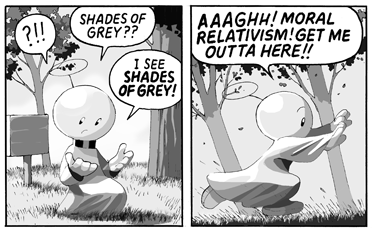
Relativism
It is a term coined by anthropologists to explain the difference in values found in different cultures, be they the Ik culture of Africa (see extract 2), or the culture of Sparta (see extract 1 the film 300) or the Eskimos (who practised geronticide or the killing of the elderly). There is also the question of which way values face (to put it metaphorically). If we consider the source of morality, is it subjective, in me, or objective, out there in the world? Relativism, rather than face at the source, can also face towards the application of values. I could quote philosophers who use it in this very way. If a value changes according to the circumstances (it's alright to lie when faced with a crazy knifeman asking "where's your friend", but not okay when asked by your boss "where were you yesterday - answer, watching Manchester United in Bremen!), then surely this, too, is relativism. Cultural Relativism A relative theory can be of two types.Cultural relativism is simply the observation when we look at different cultures that they have different views of right and wrong. We are not giving reasons for this difference, nor are we judging the cultures. We are just observing them. As one writer observed in 1934: "Morality ...is a convenient term for socially-approved habits" (Benedict: 1934). For example, consider Spartan culture. Sparta was a warrior state which thrived in the second and third centuries BC, and was well illustrated by the film the 300 which told the story of the Battle of Thermopylae in 480 BC when 300 Spartans held a pass against the huge Persian army until betrayed by a shepherd who showed the Persians a secret way through the mountains. The end or telos of Spartan culture was to produce a strong warrior race in order to survive in the cut-throat world of Greek city states. Here are some of the ways they produced this virtue of heroism. • Infanticide weak male babies were left to die on the hillside and weak female babies were thrown off a cliff. • Childen's education was taken over by the state at the age of 7, when boys were forced into the wilderness to fend for themselves. • Slavery the Spartans enslaved the Macedonian people, who had no rights. Indeed, to prove yourself a warrior it was enough to kill a Macedonian in cold blood. In this article by Jesse Prinz, an American academic, in the journal Philosophy Now, the issue of whether relativism is true or false is considered. Relativism is seen as the only coherent way to view moral reality. The question, "is morality objective?" is considered, and a number of common objections to relativism are evaluated. |
|

James Rachels' argument
James Rachels argues that we make a false inference when we say:
1. Different cultures have different moral codes.
2. Therefore there is no objective truth.
The false inference lies in the "therefore". Both appear to be statements of fact.
But statement (2) is actually a belief. We cannot prove the case that there is no objective morality, and it doesn't follow from the observation that there are different moral systems in the world.
After all, we can have different belief systems (as a matter of fact) about whether the world is round or flat, but it doesn't change the truth or falsity of the objective claims of science.
Rachels goes on to consider some consequences of relativism:
• We can't judge other societies (such as Hitler's Germany)
• We could in principle take a vote on slavery and judge its rightness by a simple majority decision.
• We can't judge our own society and find, for example, fast driving "wrong".
• Moral progress is called into doubt, where we seem to have new laws protecting human rights, for example.
Rachels concludes that:
"It makes sense to think that our own society has made some moral progress, while admitting that it is still imperfect and in need of reform" (Rachels page 23).
Rachels goes on to argue that differences in moral codes stem from differences in beliefs.
If we go to India we may be surprised to find it's wrong to eat a cow, but this is because cows have divine status in India, so relativism is correct in so far as it reminds us that morality is relative to belief systems. Yet relativism is wrong if it claims to establish that we cannot judge some practices as universally desirable and others undesirable.
For example, all cultures protect their young, otherwise we would not survive. Similarly, truth-telling is universally accepted, because trust is necessary for survival.
What relativism helps us to see, however, is that all values have some reasonable basis, and it is our task to find the reasonable basis for moral statements and establish the reasonable grounds for saying, for example, that killing is wrong.
And we must be humble about our own culture which may contain practices which we should seek to reform, where progress is still required.
Absolutism
Absolute theories of ethics establish rules or duties which must always be followed, irrespective of the circumstances.For example, some people have argued that the ten commandments in Exodus 20 are absolute rules which must always be obeyed, because they come from God.
There is a problem with this argument, however. Even in the Old Testament it seems God himself commands people to kill. For example, Joshua is commanded to destroy Jericho and its inhabitants and also annihilates the people of the city of Ai (Joshua 8), not even sparing the children.
"Then they killed all in the city, both men and women, young and old, oxen, sheep and donkeys" (Joshua 6:21)
If we argue that killing is absolutely wrong, how to we explain these apparent acts of murder (killing of the innocent children) as supposedly commanded by God himself? When does killing in war become justified?
There is a further difficulty. In court we distinguish between different degrees of murder. First degree murder is when someone kills in cold blood, for example, shooting a policeman to make good an escape.
Second and third degrees of murder have extenuating circumstances. For example, killing someone in a fit of anger because you discover they have lied or cheated on you. Then there is killing is self-defence, or shooting a burglar who you find in your house. We tend to treat the latter as manslaughter, and in law it takes a lesser penalty and sometimes, no penalty at all.
So to say "thou shalt not kill" is an absolute, even if we translate "kill" as "murder" doesn't escape the problem, "what sort of killing is acceptable"?
As soon as we admit exceptions, or particular circumstances when we would kill, we become a relativist, because we make goodness relative to some other end, such as saving a life or preventing a bigger evil.
James Rachels argues that we make a false inference when we say:
1. Different cultures have different moral codes.
2. Therefore there is no objective truth.
The false inference lies in the "therefore". Both appear to be statements of fact.
But statement (2) is actually a belief. We cannot prove the case that there is no objective morality, and it doesn't follow from the observation that there are different moral systems in the world.
After all, we can have different belief systems (as a matter of fact) about whether the world is round or flat, but it doesn't change the truth or falsity of the objective claims of science.
Rachels goes on to consider some consequences of relativism:
• We can't judge other societies (such as Hitler's Germany)
• We could in principle take a vote on slavery and judge its rightness by a simple majority decision.
• We can't judge our own society and find, for example, fast driving "wrong".
• Moral progress is called into doubt, where we seem to have new laws protecting human rights, for example.
Rachels concludes that:
"It makes sense to think that our own society has made some moral progress, while admitting that it is still imperfect and in need of reform" (Rachels page 23).
Rachels goes on to argue that differences in moral codes stem from differences in beliefs.
If we go to India we may be surprised to find it's wrong to eat a cow, but this is because cows have divine status in India, so relativism is correct in so far as it reminds us that morality is relative to belief systems. Yet relativism is wrong if it claims to establish that we cannot judge some practices as universally desirable and others undesirable.
For example, all cultures protect their young, otherwise we would not survive. Similarly, truth-telling is universally accepted, because trust is necessary for survival.
What relativism helps us to see, however, is that all values have some reasonable basis, and it is our task to find the reasonable basis for moral statements and establish the reasonable grounds for saying, for example, that killing is wrong.
And we must be humble about our own culture which may contain practices which we should seek to reform, where progress is still required.
Absolutism
Absolute theories of ethics establish rules or duties which must always be followed, irrespective of the circumstances.For example, some people have argued that the ten commandments in Exodus 20 are absolute rules which must always be obeyed, because they come from God.
There is a problem with this argument, however. Even in the Old Testament it seems God himself commands people to kill. For example, Joshua is commanded to destroy Jericho and its inhabitants and also annihilates the people of the city of Ai (Joshua 8), not even sparing the children.
"Then they killed all in the city, both men and women, young and old, oxen, sheep and donkeys" (Joshua 6:21)
If we argue that killing is absolutely wrong, how to we explain these apparent acts of murder (killing of the innocent children) as supposedly commanded by God himself? When does killing in war become justified?
There is a further difficulty. In court we distinguish between different degrees of murder. First degree murder is when someone kills in cold blood, for example, shooting a policeman to make good an escape.
Second and third degrees of murder have extenuating circumstances. For example, killing someone in a fit of anger because you discover they have lied or cheated on you. Then there is killing is self-defence, or shooting a burglar who you find in your house. We tend to treat the latter as manslaughter, and in law it takes a lesser penalty and sometimes, no penalty at all.
So to say "thou shalt not kill" is an absolute, even if we translate "kill" as "murder" doesn't escape the problem, "what sort of killing is acceptable"?
As soon as we admit exceptions, or particular circumstances when we would kill, we become a relativist, because we make goodness relative to some other end, such as saving a life or preventing a bigger evil.
This is an essay written by a student who is asked to explain the concept of relative morality. This is an Ao1 question and from a different spec but it will give you a good sense of structure and writing style suited Philosophy and Ethics. I particularly like her use of link words to develop an argument, so I've highlighted them in blue. She scored 100% on this question.
Click here
Click here
